I just briefed the Security Council in relation to the Berlin Conference on Libya. I think it’s very important to recognize that this is a major step. It was, for the first time, possible to sit around the table, all those countries that have a direct or indirect influence in relation to the conflict, and to commit them to non-interference, to commit them to support a ceasefire, to commit them to the arms embargo, to commit them to support the political process; no violations of international humanitarian law or human rights law, to commit them to the support the reform of the economic and security institutions of the country is, of course, extremely important.
But this is just the beginning.
First of all, the two parties to the conflict were not members of the Berlin Conference. And one of the parties of the conflict has not yet expressed publicly support to the conclusions even if
it is participating in the work that is taking place at the present moment – work that already has generated the first meeting of economists from both sides in relation to economic reform, work that will go on with the joint military committee with five elements indicated by each of the sides, and this was already done, and we hoped that it would be able to meet for the first time Tuesday. And the creation of a political forum that will be the entity able to lead a process of reform, allowing for the normalization of the political life of Libya, but not yet formed.
There are indications of names from the House of Representatives, indicated names from the High State Council, but there will be a number of names that the UN will have to choose and we need to have the acceptance of both parties for that to move on.
And there’s still a long way to go. We have a truce. The truce is having some violations but not widespread violations. They are localized until now.
We need to move to a ceasefire, and from the ceasefire, we need to move a real political process and we are not yet there. And so this meeting of the Security Council is very important and the pressure that the international community over the parties to the conflict and those that have an influence on them, to make sure that this roadmap is implemented, that we have the truce transformed into a ceasefire and a true political process. The pressure of the international community is essential. The role of the Security Council is essential.
Q: You talk about the credibility of this Council, Secretary-General, as it pertains to the enforcement of the arms embargo. Is this Council up to the task?
Secretary-General: One thing that, it’s important to note, is that the heads of State and governments, or representatives of the five permanent members of the Security Council, were in Berlin. They subscribed to the Berlin Communique. And the Berlin Communique is very strong in what regards for instance, the arms embargo, that until now has been violated in forms that are totally unacceptable. So, I think there is a reason to hope that conditions for a stronger consensus in the Security Council about Libya [will] be created.
Q: Mr. Secretary-General, have you asked the Security Council to adopt a resolution endorsing the Berlin plan?
Secretary-General: It’s not for me to ask that. That will, of course, depend on Member States, but I do believe that the endorsement of these conclusions by the Security Council and other steps in the follow-up could be extremely important.
Q: Did you have any bilaterals in Berlin with Haftar or Serraj?
Secretary-General: Haftar and Serraj were not part of this conference.
Q: But on the sidelines – did you meet with them?
Secretary-General: I had no meetings; it was the German presidency that had bilateral meetings with them. But, of course, my Special Representative had meetings with them.
Q: Secretary-General, can you give us a message, a personal message of the Secretary-General to those two, to Haftar and Serraj? They didn’t participate. Can you give a public message to them?
Secretary-General: My message is: accept fully the conclusions of the Berlin summit and assume that the leadership in a situation like this is a leadership for peace, is a leadership for a united Libya able to be ruled by Libyans in peace and security and cooperating with its neighbors in a positive way. Thank you very much.

